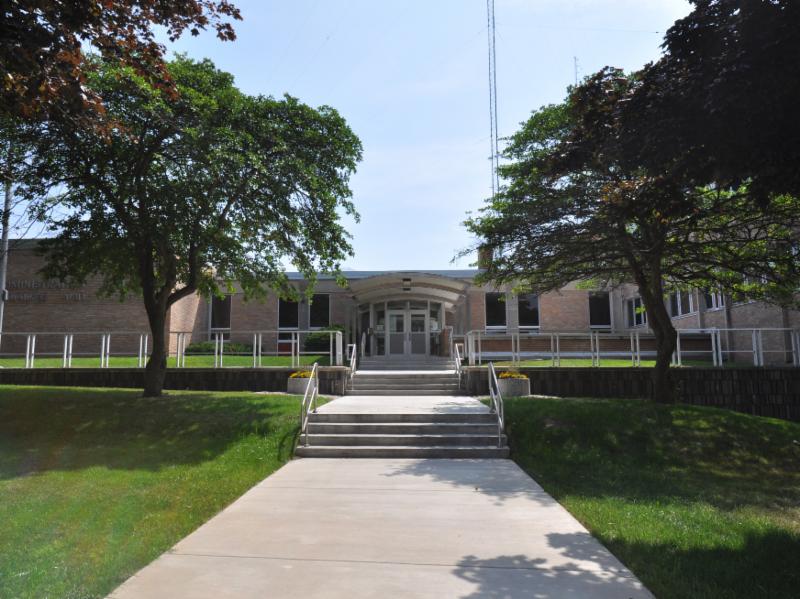The Fight Over Standardized Testing
MPS, urban school systems push federal government for testing waivers, citing lost instruction time during pandemic.

Milwaukee Public Schools Office of School Administration, 5225 W. Vliet St. Photo courtesy of Milwaukee Public Schools.
Last Thursday, outgoing Milwaukee school board President Larry Miller and Vice-president Tony Baez stood before a single television camera in the chilly air before the Milwaukee school administration building to denounce, plea and demand that the federal mandated academic standardized tests be halted at least for this year. A day earlier, April 21, they issued a press release demanding the same. Even though this week’s school board meeting would be their last, these retiring school board members were not willing to sit back and do nothing.
The demand to stop the testing during the pandemic has been coming from other states across the country. In Wisconsin, the school superintendents of Milwaukee, Madison, Racine and Green Bay wrote to the Wisconsin Department of Instruction (DPI) and U.S. Department of Education (DOEd) asking for testing waivers for this school year.
In their letter to DPI, they wrote “While we agree it is important to assess the impact of COVID-19 on each student’s learning, we do not believe that this spring’s state test will provide us with the accurate and much needed information to address student learning loss. We also believe that it would be detrimental to our students if we wait for state test results to inform parents, school boards, and communities of student progress as we already know we need significant resources and everyone’s support.”
In a February 15 letter, DPI wrote back to Milwaukee Superintendent Keith P. Posley that its hands were tied. Without a federal waiver, there was nothing it could do. Wisconsin did ask for a more limited waiver from the federal government, asking permission to not do the following:
- Measure the achievement of at least 95 percent of all students, and
- Use test participation as a factor in calculating the achievement indicator in the state’s schools and districts.
Wisconsin’s limited waiver request was based upon the denial by DOEd of blanket waivers to all requesting states across the country, which also noted the federal department might consider a more limited waiver along the lines Wisconsin was asking.
But as March 2021 was ending, DOEd granted a full waiver from student testing to the District of Columbia school system.
The DC waiver had large city school systems scratching the heads. Milwaukee had perhaps a stronger case for a waiver than DC. With the exception of special education students, 100% of Milwaukee students were virtual for most of the year. Student only started back to school in April. Grades 9, 10 and 11 will remain virtual for the remainder of the year with the exception of high school students who are in danger in failing.
In their letters to both Wisconsin DPI and the U.S. DOEd, the four Wisconsin urban superintendents made similar points that would be echoed in the DC waiver:
- The test cannot be administered equitably across the district.
- The test results may not be valid or useful.
- Student experiences learning virtually have varied significantly between students. As a result, numerous students continue to struggle.
“We believe that the schools in Wisconsin should be granted the same flexibilities on standardized testing as other school districts across the nation, such as Washington, D.C.,” says Baez in the press release.
The only way Milwaukee could administer tests to high school students is to only bring them back on a single day for testing, an alternative that was rejected as a realistic possibility in the DC case.
For Wisconsin, federal waivers for individual school districts would create a clear conflict. Wisconsin school systems would still have to test students under state law. Carolyn Stanford Taylor remains acting state superintendent until Jill Underly takes office in July. Neither is likely to grant a state waiver unless a federal waiver is granted first. And even here, the requirement for school and district report cards is codified in state law.
If waivers do not come soon, they are likely to come after the testing has been completed. At which point school officials will likely argue the test results are incomplete, invalid and not reliable – in short, a complete waste of time and money. Critics of urban schools, meanwhile, may look to use the results to bash the schools.
More about the Coronavirus Pandemic
- Governors Tony Evers, JB Pritzker, Tim Walz, and Gretchen Whitmer Issue a Joint Statement Concerning Reports that Donald Trump Gave Russian Dictator Putin American COVID-19 Supplies - Gov. Tony Evers - Oct 11th, 2024
- MHD Release: Milwaukee Health Department Launches COVID-19 Wastewater Testing Dashboard - City of Milwaukee Health Department - Jan 23rd, 2024
- Milwaukee County Announces New Policies Related to COVID-19 Pandemic - County Executive David Crowley - May 9th, 2023
- DHS Details End of Emergency COVID-19 Response - Wisconsin Department of Health Services - Apr 26th, 2023
- Milwaukee Health Department Announces Upcoming Changes to COVID-19 Services - City of Milwaukee Health Department - Mar 17th, 2023
- Fitzgerald Applauds Passage of COVID-19 Origin Act - U.S. Rep. Scott Fitzgerald - Mar 10th, 2023
- DHS Expands Free COVID-19 Testing Program - Wisconsin Department of Health Services - Feb 10th, 2023
- MKE County: COVID-19 Hospitalizations Rising - Graham Kilmer - Jan 16th, 2023
- Not Enough Getting Bivalent Booster Shots, State Health Officials Warn - Gaby Vinick - Dec 26th, 2022
- Nearly All Wisconsinites Age 6 Months and Older Now Eligible for Updated COVID-19 Vaccine - Wisconsin Department of Health Services - Dec 15th, 2022
Read more about Coronavirus Pandemic here
K-12 Education
-
The Unknown MPS Office
 Jun 26th, 2024 by Terry Falk
Jun 26th, 2024 by Terry Falk
-
Who Is Eduardo Galvan?
 Jun 19th, 2024 by Terry Falk
Jun 19th, 2024 by Terry Falk
-
How Will School Board Hire New Superintendent?
 Jun 10th, 2024 by Terry Falk
Jun 10th, 2024 by Terry Falk






















I agree with the MPS leaders on this. It’s been a chaotic year. Any test results are more likely to reflect this chaos than to provide useful information for teachers and decision makers. All schools, not just MPS, have a lot on their plates at the moment and administering a yearly standardized test is a low priority. All students have faced enough stress already. They know it has been a difficult year academically.
Testing and accountability are important. Give the schools and the students a chance to recover and catch their breath. Plan the tests for next year, or better – consider a change to the test timing or format so that the results are most useful to the teachers. If there are seniors who would like the opportunity to show their progress to colleges, give them the option to take the tests.
Every school district, parent and student dealt with the same pandemic.
Let’s test and see which districts made the best decisions for the children in their districts.
For those school districts that saw disproportionately lower test scores, let’s learn what we could do better for next time.
dmkrueger2 – Your points are valid. However, they will be equally valid next year. The effects of this pandemic on academics are likely to last a long time. Yes, Milwaukee and the larger school districts are the most vocal about postponing these tests, but I doubt the other districts are enthusiastic about administering them. As I mentioned, all districts have a lot on their plates right now.